“I hope it’s like a mirror.”
(Călin Peter Netzer on Child’s Pose)
“They fuck you up, your mum and dad / They may not mean to, but they do.”
(Philip Larkin, “This Be The Verse” [1971])
If a toxic abusive mother raised you, be forewarned. Child’s Pose is a harrowing and deeply traumatic film that will leave you shaken far beyond any previous cinematic exploration of familial horror and dysfunction. Another superb example of the Romanian New Wave Cinema, Child’s Pose (Pozitia copilului), directed by Călin Peter Netzer, and co-written by Netzer and novelist Răzvan Rădulescu, emerged from lengthy discussions Netzer and Rădulescu had about their own domineering mothers. The result is one of the most emotionally demanding films one can imagine.
The plot of Child’s Pose is deceptively simple: a wealthy Romanian mother, Cornelia Keneres (Luminita Gheorghiu) will stop at nothing to keep her son Barbu (Bogdan Dumitrache) from going to jail after he hits and kills a young boy while speeding on the freeway in a race with another driver. That a wealthy son is responsible for the death of an underprivileged child is important in that it is used to force us into an engagement with a spectacularly dysfunctional mother-son relationship and, at a secondary level, to explore the evil of the class system of Romania, a society rife with blatant corruption and moral decay.
As Dana Stevens notes in Slate, “the original title, Pozitia copiluilui, refers to the literal physical position of a child – an image which might have several meanings in the movie’s context, none of them involving a relaxing forehead-to-floor asana,” and much more to do with the cringing, child-like, defeated persona of Barbu, who seems to have no life or will of his own.
I have never witnessed another film that so effectively captures the inescapable trauma of being the spawn of such a dangerously toxic pathological mother. There is no doubt in my mind that both Netzer and Rădulescu understand first hand the pathology of the monstrous parent; the level of realism in the film obviously has much to do with personal experience.
Netzer even arranged for Luminita Gheorghiu to meet with his own mother, one of the real-life “models” for the film, so Gheorghiu could witness the warped logic of the narcissist first hand. Gheorghiu’s performance is breathtaking. She is in every shot in the film, and the camera is constantly following her, in the same way that one can never fully escape the ever-present toxicity of a brutalizing narcissistic mother in real life.
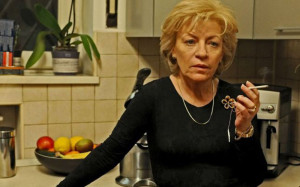 As Netzer told R. Kurt Osenlund during an interview in Filmmaker Magazine,
As Netzer told R. Kurt Osenlund during an interview in Filmmaker Magazine,
“the script was written by me and Razvan Radulescu, and we had very long discussions about our mothers. Because our mothers, in our childhoods, were very domineering. That was the starting point of the screenplay. There are various parts of my mother in the character of Cornelia. For example, I had my mother meet Luminita, so Luminita could have an idea of what she was like.”
Shot on a shoestring budget in 30 days with two handheld digital cameras, Child’s Pose relies upon an uncomfortable enforced intimacy that renders us unable to escape the toxic mother. We are so closely tied to this woman that we feel unable to breathe, as if we are inside her womb, desperate to escape her manically driven behavior, her torturous illogic, her endless lies and manipulations of her family and other victims, her casual bribery, destruction of evidence, witness tampering, and her willful psychological castration of both her husband and son.
 As the film opens, we meet Cornelia, who is constantly accompanied by her sister in law Olga (Natașa Raab). The two of them are overly privileged wealthy self-absorbed narcissists, existing in a world of endless power without any visible means of support. Cornelia is supposed to be an architect, but we never see her working at her trade; we do, however, see her hobnobbing with well-connected politicians, and dancing up a storm at an official party in the film’s opening minutes. She’s clearly at home in a world of power and privilege.
As the film opens, we meet Cornelia, who is constantly accompanied by her sister in law Olga (Natașa Raab). The two of them are overly privileged wealthy self-absorbed narcissists, existing in a world of endless power without any visible means of support. Cornelia is supposed to be an architect, but we never see her working at her trade; we do, however, see her hobnobbing with well-connected politicians, and dancing up a storm at an official party in the film’s opening minutes. She’s clearly at home in a world of power and privilege.
Where exactly does all their money come from? Don’t ask. In the vampire economy of the new world order, as exemplified in contemporary Romania, it is probably better not to know such things.
In a dinner party scene, Cornelia and Olga discuss the accidental castration of a man who was a victim of botched surgery. Both display an astonishing lack of empathy for a man who lost his penis to an incompetent doctor, and describe the surgery in detail as we listen and watch in horror. Castration is routine to these women, but they go even further, and rapidly decide that the surgeon is not morally culpable, because he meant no harm. This scene takes on an important resonance because it offers a glimpse into the mind of a sociopath like Cornelia. In the same way that she excuses the surgeon’s incompetence, she casually shrugs off any moral responsibility on her part, or on the part of her son.
In Cornelia’s twisted logic, she always “means well” so anything she does, no matter how ghastly or corrupt, is morally upright. Similarly, her spoiled and overly dependent son “means well,” so in her eyes he is never responsible for his actions. In their delusional, grandiose schemes, they take the job of manipulating their loved ones as seriously as a state official, acting as a metaphor for the corrupt police and the governmental and corporate thugs who oppress those beneath them. Cornelia and Olga will not be denied their life of luxury; they spend their time smoking, drinking, endlessly chattering on their cellphones, bitterly running down family members and manipulating everyone in their family. Everyone is fair game.
In one very uncomfortable scene, Cornelia tries to buy off her maid with a gift of shoes that won’t even fit her. This is no gift; it is an act of domination. The maid trembles as she accepts the shoes that will be of no use to her, but in Cornelia’s mind, again, she feels she “means well” so she does not even notice the mortified behavior of her maid. Narcissists can’t empathize, they feel entitled, they see other people as an extension of themselves. They have no sense of humor, and they will stop at nothing to get what they want, precisely because they feel that they are entitled. Gheorghiu so fully embodies the pathologies of the narcissistic mother that by the end of the film you actually feel that you have been in the presence of madness; indeed, the film makes the audience feel like the child of a sociopath.
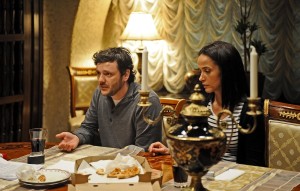 Children of narcissistic parents are brainwashed by their toxic mothers and fathers, just as Cornelia’s son Barbu is manipulated, unable to detach from his suffocating mother and subjected to the emotional abuse that includes infantilization, gas lighting, triangulation and many other forms of controlling behavior. Barbu’s father, Florin (Domnul Făgărășanu) is a shambling wreck who long ago gave up on dealing with Cornelia’s whims; in turn, Barbu is putatively married to Carmen (Ilinca Goia), but the union is a failure; he simply does not know how to relate to another adult, much less function as a husband.
Children of narcissistic parents are brainwashed by their toxic mothers and fathers, just as Cornelia’s son Barbu is manipulated, unable to detach from his suffocating mother and subjected to the emotional abuse that includes infantilization, gas lighting, triangulation and many other forms of controlling behavior. Barbu’s father, Florin (Domnul Făgărășanu) is a shambling wreck who long ago gave up on dealing with Cornelia’s whims; in turn, Barbu is putatively married to Carmen (Ilinca Goia), but the union is a failure; he simply does not know how to relate to another adult, much less function as a husband.
Most significant to Child’s Pose is that the child of a narcissist is brainwashed into a state of guilt and obeisance. Cornelia incessantly runs guilt trips on Barbu, who cannot win in this struggle without leaving the toxic parent. Cornelia’s love is utterly conditional; she withdraws it every time Barbu attempts to take responsibility for his own actions and behave like an adult. She abuses him for his arrested development, but she herself is responsible for it. He cannot win in this struggle. He must leave his mother in order to grow up and survive, and he tries to tell her this at a few key moments in the narrative.
Yet in her own mind, everything Cornelia does is for Barbu, and she constantly reminds him of this as she runs from one meeting to the next for most of the film’s running time “fixing things,” to ensure that Barbu never gets to behave as a grown up man by taking responsibility. Barbu has no more significance to Cornelia than her other ‘belongings,’ such as her husband, her BMW, her ever present cigarettes and the pills she lives on, which appear to be some sort of speed. Indeed, she’s a speed freak, constantly driven by pharmaceuticals, and her own madness.
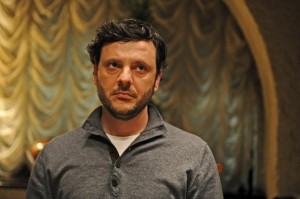 Cornelia thinks that she controls everything around her. And so, when she receives news of the fatal accident, she instinctively springs into action. She never asks her son how he feels about the car crash. It never even occurs to her that he feels anything; pain, fear or guilt. Indeed, no one else is real to Cornelia; she thinks only, and always, of herself. She has to run everything. She even tells Barbu exactly what to say to the police during his initial interrogation by the authorities. At the same time, she attempts to seduce him into a “child state” with “loving acts” that are simultaneously manipulative and utterly repellent.
Cornelia thinks that she controls everything around her. And so, when she receives news of the fatal accident, she instinctively springs into action. She never asks her son how he feels about the car crash. It never even occurs to her that he feels anything; pain, fear or guilt. Indeed, no one else is real to Cornelia; she thinks only, and always, of herself. She has to run everything. She even tells Barbu exactly what to say to the police during his initial interrogation by the authorities. At the same time, she attempts to seduce him into a “child state” with “loving acts” that are simultaneously manipulative and utterly repellent.
In one particular scene that turns uncomfortably sexual, Barbu lies like a baby on his belly in bed. On his back, we see some bruises, the result of a beating he suffered at the hands of the murdered boy’s family at the scene of the accident. Crucially, Netzer does not show the beating on screen, just the result, reinforcing the fact that Cornelia does not see the same reality others see. As Barbu lies in the bed, Cornelia orders him to take off his t-shirt, and begins her metaphorical sexual assault. She climbs onto the bed and mounts him from behind.
Wearing a rubber glove, she applies an anti-inflammatory ointment to the bruises on his back, creating a scene out of an Oedipal nightmare. Cornelia is not just applying ointment, she is effectively raping her own son from behind, and the soundtrack is straight from a porn film, with overly amplified smacking and liquid sounds used to suggest anal rape. As she continues her massage, she rocks her abdomen up and down against his buttocks, as if lost in an erotic frenzy. Barbu is clearly disgusted as much by his mother’s behavior as his own inability to defy her. We hear the smacking sounds of the liquid as it is applied to his neck, as Cornelia works her way down his back in an unmistakably sexual manner.
Similarly disturbing is Cornelia’s manipulation of the police. When the initial accident report lists Barbu’s speed as 140 km/h when he hit the young boy, Cornelia intervenes, insisting that it must have been 110 km/h, closer to the legal speed limit. She then agrees to help the chief officer with a landscaping permit for his property, essentially asking him to falsify documents to ensure Barbu’s exoneration. Cornelia is also not above tampering with witnesses; why should she be? Contacting the other driver involved in the accident, the slimy Dinu (Vlad Ivanov), Cornelia tries to buy his silence, only to recoil at the price; 100,000 euros. Everyone is on the take.
Unsurprisingly, Cornelia also tries to buy off the victim’s family. Near the end of the film, Cornelia visits the parents of the slain boy. She drives into the poverty stricken neighborhood to the home of the boy’s parents, looking through the window of her BMW as if she were a queen visiting the slums. Barbu, terrified, sits in the back seat of the car in a fetal position, afraid to face the parents of the child he killed; this makes audience identification with Barbu all the more complex.
We would like to see Barbu behave like an adult, but we know that Cornelia has effectively destroyed his spirit with her almost complete suffocation of his independence. In the courtyard of the humble home of the slain boy, after casually walking by his coffin and a large cross at the front of the home, neither of which have any effect on her, Cornelia brazenly knocks on the door of the parents.
The father of the dead child (Adrian Titieni) opens the door, and is momentarily speechless. Staring at Cornelia in shock, he suddenly disappears into the house, and we hear anguished cries from within. Anyone else would think twice before proceeding, but nothing stops the relentless Cornelia. She waits patiently until she is finally invited into the home. Her idea of begging for forgiveness on the part of her son is to deflect any guilt on his part. Barbu, she insists, did not mean to do anything wrong. He means well. She means well.
Speaking to the dead boy’s mother, Cornelia quickly makes the accident about herself. All pain and suffering, no matter who the victim is, has to do with Cornelia. She goes on and on about how much pain she feels about her own losses. With a complete lack of empathy, she actually compares the possible loss of her son (to jail) with the death of the young boy. Everything that comes out of her mouth is a lie, a manipulation, or a distortion, yet one gets the eerie feeling that she believes every word she says, at least at the moment she says it. She effortlessly twists words and truths as an architect moves huge steel beams in the sky to conform to a specific and rigid plan.
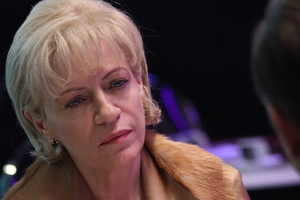 Cornelia feels nothing for the distraught parents, but as a gifted sociopath, she knows exactly how to fake emotion. It takes her several minutes to work up some tears, no doubt shed for herself, as she pretends that she has nothing but love, understanding and pathos for the parents. She pulls out an envelope stuffed with cash, clearly offering a bribe, saying that she wishes to help pay for the funeral. When the parents turn down the money, she insists that they take it for the brother of the deceased. Through it all, the mother looks at Cornelia with an impassive gaze; she’s dumbfounded by Cornelia’s actions, and doesn’t know how to respond. Eventually we are allowed to escape this torturous scene when Cornelia returns to her BMW.
Cornelia feels nothing for the distraught parents, but as a gifted sociopath, she knows exactly how to fake emotion. It takes her several minutes to work up some tears, no doubt shed for herself, as she pretends that she has nothing but love, understanding and pathos for the parents. She pulls out an envelope stuffed with cash, clearly offering a bribe, saying that she wishes to help pay for the funeral. When the parents turn down the money, she insists that they take it for the brother of the deceased. Through it all, the mother looks at Cornelia with an impassive gaze; she’s dumbfounded by Cornelia’s actions, and doesn’t know how to respond. Eventually we are allowed to escape this torturous scene when Cornelia returns to her BMW.
Yet the film’s final scene offers some small measure of hope, as Barbu seems, for the first time, to effectively challenge his mother’s management of every detail of his life. Sitting in the backseat of the car, he finally asks his mother to “let him out,” and she reluctantly complies by releasing the child safety lock on the car doors, and Barbu stumbles out of the car. Crucially, the handheld camera, which has always been very close up on Cornelia, does not follow Barbu, as he finally summons the bravery to face the father of the boy he killed. Instead of going in for a closer shot of Barbu and the father as they interact, Netzer traps us inside the car; we cannot fully see or hear what takes place between Barbu and the father.
We are limited to what we can view from the back and side windows and the rear view mirror of the car. We can barely see Barbu as he confronts the father. He’s trembling and unable to speak or move for a moment, head hanging in shame, like a little boy who has done wrong but wishes to make things right. The scene allows for ambiguity, but I for one, wept profusely when Barbu and the boy’s father clumsily take one another’s hand for a brief moment, evoking the possibility of some sort of honesty and rapprochement.
Interestingly, in making the film Netzer says that he tried very hard to avoid the controlling behavior we associate and expect of great auteurs. Netzer relied on the director of photography, Andrei Butica and his crew to help make decisions on the set about how to create the story, and how to document it. Though he used a shooting script and storyboards, Netzer felt more comfortable in allowing his collaborators to contribute to the creative process. As he told Osenlund of the intensely intimate visual style the film displays,
“We shot on two digital cameras, and we decided that we’d rehearse the whole scene, and then after that, I’d leave the freedom to the d.p. and the other cameraman to shoot the scene, and follow the actors, and look at the world from their point of view. So it was an exercise for me in sort of losing control. It was important on set as the director because the story of Child’s Pose is very close to me. I decided to give the crew the freedom to tell the story through their eyes.”
Similarly, Netzer allowed the actors, especially Gheorghiu and Dumitrache a great deal of latitude in interpreting and performing the roles of Cornelia and Barbu. As a final touch of realism, the film is almost entirely devoid of music; the only songs we hear are brief snippets of classical music and pop songs used as cellphone ring tones, incessantly beckoning the characters to yet another desperate rendezvous. The cellphones are almost a character in the film; they are the umbilical cords that attach all the characters in a web of lies and deceptions.
When asked what he hopes to accomplish with Child’s Pose, Netzer displayed an openness that is not all that common with film directors; when asked by Osenlund what he hoped the film might accomplish, Netzer haltingly replied,
“I don’t know. I don’t know what to say. Maybe someone will reconsider his behavior because of the son character’s behavior toward his parents. Or maybe the other way around. I hope it’s like a mirror.”
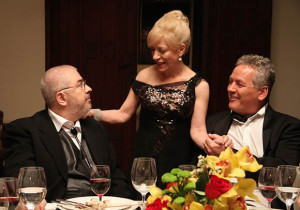 Child’s Pose was awarded the Golden Bear and the FIPRESCI Prize at the 2013 Berlin International Film Festival, and was Romania’s submission to the 86th Annual Academy Awards. Early on, the Hollywood Reporter listed Child’s Pose as one of four top contenders for the award for Best Foreign Language Film, but in the end, the film wasn’t even nominated. Besides Best Documentary, Best Foreign Language films are the only works I invest anything in emotionally when it comes to the Academy Awards, and the winner, predictably, was the commercially viable and artistically bankrupt The Great Beauty, an insignificant semi-remake of Federico Fellini’s masterwork La Dolce Vita (1960).
Child’s Pose was awarded the Golden Bear and the FIPRESCI Prize at the 2013 Berlin International Film Festival, and was Romania’s submission to the 86th Annual Academy Awards. Early on, the Hollywood Reporter listed Child’s Pose as one of four top contenders for the award for Best Foreign Language Film, but in the end, the film wasn’t even nominated. Besides Best Documentary, Best Foreign Language films are the only works I invest anything in emotionally when it comes to the Academy Awards, and the winner, predictably, was the commercially viable and artistically bankrupt The Great Beauty, an insignificant semi-remake of Federico Fellini’s masterwork La Dolce Vita (1960).
The omission of Child’s Pose – even from the list of Academy Award nominees – severely limits the number of screens on which it will play, and thus makes the film less accessible to millions of viewers. Nevertheless, the film is doing remarkably well at finding its audience worldwide, and critics have nothing but praise for the Child’s Pose, most often singling out the depth and significance of Gheorghiu as the monstrous Cornelia, a mother so toxic that with one killing look she could easily destroy Medea, or even the Gorgon.
Author’s Note: For my mother; in the wake of your recent death, I am only now beginning to grasp the true nature of your condition. For my father; it’s clear to me that you had only one choice to survive: you fled for your life. I forgive you both.
Gwendolyn Audrey Foster is a Professor of Film Studies in the Department of English, University of Nebraska, Lincoln, with many publications to her credit. She writes regularly for Film International; her website can be found here.
References
Stevens, Dana (2014), “Child’s Pose: It Ain’t About Yoga”, Slate, 21 February. Accessed 17 March 2014.
Osenlund, R. Kurt (2014), “Child’s Pose Director Călin Peter Netzer on Rigorous Preparation, Letting Go on Set, and Riding the Romanian New Wave”, Filmmaker Magazine, 19 February. Accessed 17 March 2014.

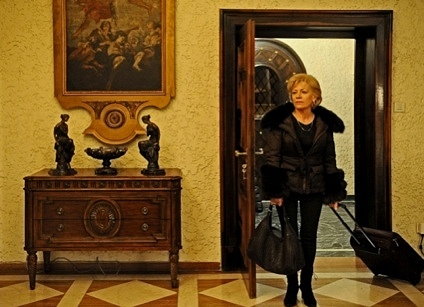
I have had several people tell me my article here made them feel a little afraid to see Child’s Pose. Please remember that this is my own very subjective point of view. Many see the film as a black comedy and I don’t reject that interpretation. I can’t wait to see the next film by the talented Călin Peter Netzer.
Your first paragraph instantly had me feeling like I should avoid this one completely. After reading the rest though, I’m definitely going to hunt Child’s Pose down and watch. I think anyone who has ever dealt with a narcissist should try to sit through it just to help them realize that they’re not the crazy one – as narcissists end up making a person feel.
I find it interesting that some find this to be a “black comedy”. (as mentioned in your comments) Possibly because narcissists’ behavior is so absurd to them – no one like this woman could possibly exist, so they’ll find it amusing. (unfortunately, it’s more common than anyone thinks)
Thanks, Nora.
Yes, we are often surrounded by narcissists, sociopaths, and even psychopaths in our everyday lives – in the workplace and in our own families. We operate under the false assumption that all humans are coming from the same place psychologically, but some may as well be a different species. New science in brain chemistry demonstrates the difference among us. Scientists can now document the brain lacking in empathy with imaging techniques.
Of course myriad cautionary tales from the bible to the horror film exist to prepare us to engage with the malignant people in our lives, whether they are our family, our boss, or our leaders. It helps to know that beneath the facade of the narcissist is a needy self-loathing isolated creature who is terrified of being “found out.” Great opera, theater, art, horror, fairy tales and legends all resonate with this profundity.
I can easily see why Child’s Pose is experienced by some as a black comedy because, to many, Cornelia’s behavior may seem absurdly driven and over-the-top…but in truth many people actually behave exactly this way. People often laugh at things that are ghastly and horrifying.
I admire Netzer’s film immensely in that it avoids trivializing a central human story and also employs it brilliantly as a political allegory. It is a great film. An honest and courageous film.
Thanks for all your remarks.
You’re absolutely right, Gwendolyn – it’s actually comforting in a small way to know that narcissists actually hate themselves. I often hear you should “pity them.” (easier to do once they’re out of a person’s life completely, of course)
I read about the ability to use imaging techniques to determine a lack of empathy… I find it fascinating!
Right after reading your article(s), I’d looking into purchasing it right away, but seems I have to wait until the dvd is released May 27th. I’m really looking forward to watching it!
Thanks Nora,
Often a sociopathic narcissist grows tired of the victim and simply drops them.
But if it is someone in your family, it is way more difficult and complex. They cannot help but destroy you. It feels like a horror movie when you know the hero must not be seduced by the Monster. The only choice is to walk away entirely, which is what Barbu, the son in Child’s Pose knows he must do. It is incredibly powerful and moving when he begins to do this at the end of the film.
I was very lucky in that I had the strength, instinct and resolve to avoid my mother completely, not an easy thing to do. I was also lucky that my grandmother stepped in to raise me and make sure I went to college. Still, it is extremely painful to cut yourself off from your toxic family and your own mother. You still love the person, but you can’t go near them any more than you can hug a snarling beast.
I feel tremendous empathy for anyone who has mentally ill and abusive family members. They often feel marked by trauma, guilt and social stigma. Society insists the family unit is sacred, nurturing and loving for all; but for many people family is a living hell. Child’s Pose challenges the pervasive and destructive myth of the inherently nurturing nature of parents and family by exposing the pathology of abusive narcissistic familial toxicity.
I may need to return to the film and write about the struggle of Barbu. He has no idea what to do with his anger at his mother and he often inflicts it on himself. His struggle is so beautifully and tragically rendered in the film. Child’s Pose is a horror film of sorts, but instead of relying on spooky devices and shock tactics, it stares evil right in the face where it lives and breathes – in reality- not in Gothic mansions or CGI monsters.
Very true. Leaving the victim a mess who never gets any closure until they finally find the strength to gain it on their own.
You were very lucky indeed… though horribly sad, I’m always very happy to hear someone was able to escape it and had someone in their life to care for them properly. Wonderful that your Grandmother did this for you! I can relate. (mother as well) I didn’t escape it completely until she passed away in the 90s, (they can still do damage from 3000 miles away!) but I had to cut off from pretty much all family in order to try to escape it originally. As you said, it definitely was not easy to do that.
Obviously, that’s why this film is appealing to me. On one hand, it will very likely disturb me. On the other hand… I think anyone who was a victim, or doesn’t yet even realize they’re a victim, should see a film like this just to know it happens everywhere and they’re certainly not alone.
I’d be interested in reading your article on Barbu’s struggle if you do write it. You are obviously well-versed on the subject!
I am not an expert, but I read a great deal of scientific literature suggested to me by a friend who is an expert in the field. I am a bit of a closet science nerd and I read a lot of scientific journals that are outside my field. I oversimplify; narcissistic disorders, sociopathology, and psychopathic behavior are not uniform or easily defined, and there is a lot of debate about their classification -but it all relates back to a demonstrable lack of empathy.
Having a basic grasp on narcissism and sociopathology not only helps me to understand the behavior of my mother and my family, but it also helps me understand many people in academe, a workplace teeming with narcissists and sociopaths, many of whom rise in power.
Academe and other specific workplaces foster an environment in which people lacking in empathy not only do well, but they get kicked upstairs into powerful positions. Obviously politics is another hotbed of toxic narcissists. I recently read a study of the high level of sociopaths and the low level of empathy found in Wall Street executives. I find this science fascinating and revealing. It says a lot about corporate think and capitalist greed. Why billionaires always need more….and more….and are never satisfied.
I am also interested in collective narcissism and “group pathology,” which gives rise to fascism. How else can you explain a culture so lacking in empathy that it allows the casual and rampant destruction of our own environment, planet earth- through catastrophic environmental destruction? We know better, but we are too selfish to save our own world.
I do hope you get to see Child’s Pose. I was so moved by the film. It takes great courage to face our monsters, but it really helps us heal. That’s my take anyway.
It is kind of you to share. Thanks!
Child’s Post is on my list of films to see. I’m glad I’ve read your review first, so I can prepare myself. I wouldn’t say I’m ‘afraid’ to see the film now, as you mentioned — but I am accepting this is going to be an intense one to watch.
I have to admit, I probably am a little too close to this material so I probably have a stronger reaction to the film which left me in tears.
Some take it as a black comedy, and I can see that view too!
I hope you get to see Child’s Pose soon!
Thanks for your remarks!
Cheers;
Gwendolyn
Thanks for bringing this one to my attention. I’m not going to say I’m looking forward to watching it but it definitely sounds like one of those films which I ought to watch. I think I may have to make sure I’m not already feeling in the least bit down to start with and line up some comedy for afterwards!
After I’ve read your article, I feel a little attempted to see the film. This information is really prepared me on how the Child’s Pose will be like. Glad to click into your site for these extraordinary film story.
Romanian movies first caught my attention with Cristian Mungiu’s 4 Months, 3 Weeks and 2 Days and Cristi Puiu’s The Death of Mr. Lazarescu, both compelling movies.
Child’s pose acts like an endoscopy inside’s Romanian elite world where people like to use their wealth as a business card to get to what they want. You depicted Cornelia faultless; she’s narcissistic, suffocating, manipulative and controlling. Barbu doesn’t stand a chance against her and it’s agonizing to watch him struggling with guilt while Cornelia acts like his accident is just mundane stuff.
This was a great portray of the post-communist Romania and it seems things didn’t change that much under democracy.
Endoscopy is a perfect word here. A bloated elite corpse is corrupted by the endless pursuit of power & wealth. And things only appear to be worse under a so-called democracy. This seems to be a significant point for Netzer. I wonder if, in a way, Barbu stands for the Romania who really should throw over these fatcat capitalist crooks? I may be pushing it a little to read the film this way, but it seems to me a supportable idea. Romanian films are just superb.
Thanks for the comments, Claudia!
This is another one of those classic films. The whole script in itself is genius if you ask me. Now I wanna watch it again after reading about it.
Child’s Pose is definitely worth another look. I can’t wait to see a new film from Netzer! My take on Child’s Pose is completely subjective, of course, and there are many different ways to read the film. I respect alternate readings very much. I have great respect for my colleagues, even and especially when we disagree.